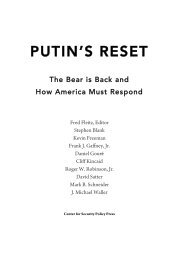Interest
Henry
Henry
Create successful ePaper yourself
Turn your PDF publications into a flip-book with our unique Google optimized e-Paper software.
RUSSIA<br />
Trump’s activities, there are undoubtedly other<br />
worthy cases not mentioned here, but our interest<br />
is in overall patterns.<br />
Note that none of the activities and business<br />
connections related below necessarily involved<br />
criminal conduct. While several key players<br />
do have criminal records, few of their prolific<br />
business dealings have been thoroughly investigated,<br />
and of course they all deserve the presumption<br />
of innocence. Furthermore, several of<br />
these players reside in countries where activities<br />
like bribery, tax dodging, and other forms of<br />
financial chicanery are either not illegal or are<br />
rarely prosecuted. As former British Chancellor<br />
of the Exchequer Denis Healey once said, the<br />
difference between “legal” and “illegal” is often<br />
just “the width of a prison wall.”<br />
So why collect and review material that either<br />
doesn’t point to anything illegal or, in some<br />
cases, may be impossible to verify? Because<br />
when it comes to evaluating the probity of senior<br />
public officials, the public has the right to<br />
know about any material allegations—true,<br />
false, or, most commonly, unprovable—about<br />
their business partners and associates, so long as<br />
this information is clearly labeled as unverified.<br />
Furthermore, the individual case-based approach<br />
to investigations employed by most investigative<br />
journalists and law enforcement agencies<br />
often misses the bigger picture: the global networks<br />
of influence and finance, licit and illicit,<br />
that exist among business people, investors, kleptocrats,<br />
organized criminals, and politicians, as<br />
well as the “enablers”—banks, accounting firms,<br />
law firms, and havens. Any particular component<br />
of these networks might easily disappear without<br />
making any difference. But the networks live on.<br />
It is these shadowy transnational networks that<br />
really deserve our scrutiny.<br />
Bayrock Group LLC—<br />
Kazakhstan and Tevfik Arif<br />
We’ll begin our tour of Trump’s Russian/<br />
FSU connections with several business<br />
relationships that evolved out of the curious case<br />
of Bayrock Group LLC, a spectacularly unsuccessful<br />
New York real estate development company<br />
that surfaced in the early 2000s and, by<br />
2014, had all but disappeared except for a few<br />
lawsuits. As of 2007, Bayrock and its partners<br />
reportedly had more than $2 billion of Trumpbranded<br />
deals in the works. But most of these<br />
either never materialized or were miserable failures,<br />
for reasons that will soon become obvious.<br />
Bayrock’s “white elephants” included the<br />
46-story Trump SoHo condo-hotel on Spring<br />
Street in New York City, for which the principle<br />
developer was a partnership formed by Bayrock<br />
and FL Group, an Icelandic investment company.<br />
Completed in 2010, the SoHo soon became<br />
the subject of prolonged civil litigation<br />
by disgruntled condo buyers. The building<br />
was foreclosed by creditors and resold in 2014<br />
after more than $3 million of customer down<br />
payments had to be refunded. Similarly, Bayrock’s<br />
Trump International Hotel & Tower in<br />
Fort Lauderdale was foreclosed and resold in<br />
2012, while at least three other Trump-branded<br />
properties in the United States, plus many other<br />
“project concepts” that Bayrock had contemplated,<br />
from Istanbul and Kiev to Moscow and<br />
Warsaw, also never happened.<br />
Carelessness about due diligence with respect<br />
to potential partners and associates is one<br />
of Donald Trump’s more predictable qualities.<br />
Flying by the seat of the pants, he hooked up<br />
with Bayrock rather quickly in 2005, becoming<br />
an 18 percent minority equity partner in the<br />
Trump SoHo, and agreeing to license his brand<br />
and manage the building. 7<br />
Exhibit A in the panoply of former Trump<br />
business partners is Bayrock’s former Chairman,<br />
Tevfik Arif (a.k.a. Arifov), an émigré from<br />
Kazakhstan who reportedly took up residence<br />
in Brooklyn in the 1990s. Trump also had<br />
extensive contacts with another key Bayrock<br />
Russian-American from Brooklyn, Felix Sater<br />
(a.k.a. Satter), discussed below. 8 Trump has<br />
lately had some difficulty recalling very much<br />
about either Arif or Sater. But this is hardly<br />
surprising, given what we now know about<br />
them. Trump described his introduction to<br />
Bayrock in a 2013 deposition for a lawsuit that<br />
was brought by investors in the Fort Lauderdale<br />
project, one of Trump’s first with Bayrock:<br />
“Well, we had a tenant in . . . Trump Tower<br />
called Bayrock, and Bayrock was interested in<br />
getting us into deals.” 9<br />
According to several reports, Tevfik Arif was<br />
originally from Kazakhstan, a Soviet republic<br />
until 1992. Born in 1950, Arif worked for 17<br />
10 THE AMERICAN INTEREST



